

'A pandemic of abuses': human rights under attack during Covid, says UN head. The world is facing a “pandemic of human rights abuses”, the UN secretary general António Guterres has said.
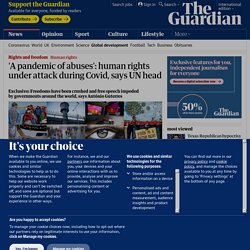
Authoritarian regimes had imposed drastic curbs on rights and freedoms and had used the virus as a pretext to restrict free speech and stifle dissent. Writing exclusively in the Guardian, Guterres said the Covid-19 pandemic had rolled back years of progress on human rights, and that abuses had “thrived because poverty, discrimination, the destruction of our natural environment and other human rights failures have created enormous fragilities in our societies”. There has been a global crackdown on opposition activists and human rights defenders, increased attacks on journalists and moves to curb free speech, censor the media, roll out invasive tracking apps and put in place extreme surveillance measures, many of which are likely to far outlast the virus. A recent report by Human Rights Watch found that at least 83 countries had used Covid-19 as a justification to attack free speech.
Are individualistic societies worse at responding to pandemics? UK Prime Minister Boris Johnson recently suggested that coronavirus infections are higher in the UK than Germany or Italy because Britons love freedom more, and find it harder to adhere to control measures.
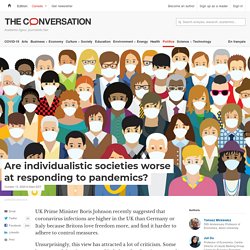
Unsurprisingly, this view has attracted a lot of criticism. Some have argued that Germany and Italy love freedom just as much as the UK . The response to Covid-19 is an opportunity to redesign a world free from slavery - Anti-Slavery International. Short term and long term measures that build resilience and prevent an increase in modern slavery. A blog by Ryna Sherazi As we provide emergency outreach and support to at-risk communities – food, hygiene materials, education and information – we are also observing and documenting the coronavirus-related impacts in order to build resilience and prevent an increase in modern slavery.
We know that Covid-19 has the potential to negatively affect everyone on earth, but it will not affect everyone equally. The need to isolate, to retain a livelihood, to access healthcare and withstand the economic shock of lost income, coupled with sharp inflationary prices, are all likely to affect the poor far more severely than the rich. Anti-Slavery International has worked for 180 years with the world’s most vulnerable people to ensure that we see a final end to modern slavery, and realise freedom from slavery for everyone, everywhere, always. Why are Africa's coronavirus successes being overlooked? Remember, early on in the Covid-19 pandemic, the speculation as to how apocalyptic it would be if this disease hit the African continent?
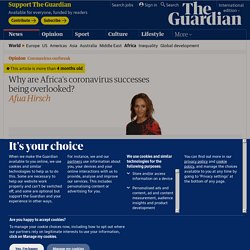
I do. There was deep anxiety about what it would mean for countries with lower income populations, dominant but harder-to-regulate informal economies and far fewer healthcare facilities than the UK or Italy. There have been coronavirus mistakes and misjudgments, and deaths, and each one is a tragedy. Arundhati Roy: ‘The pandemic is a portal’ Who can use the term “gone viral” now without shuddering a little?
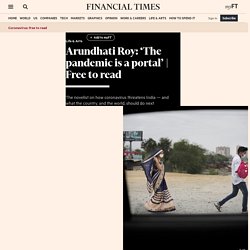
Who can look at anything any more — a door handle, a cardboard carton, a bag of vegetables — without imagining it swarming with those unseeable, undead, unliving blobs dotted with suction pads waiting to fasten themselves on to our lungs? Who can think of kissing a stranger, jumping on to a bus or sending their child to school without feeling real fear? Who can think of ordinary pleasure and not assess its risk? Who among us is not a quack epidemiologist, virologist, statistician and prophet? Which scientist or doctor is not secretly praying for a miracle? Travel industry fears Covid-19 crisis will cause more holiday companies to collapse. The travel sector is bracing itself for the collapse of yet more holiday companies as businesses continue to struggle to meet the challenges of the Covid-19 crisis.
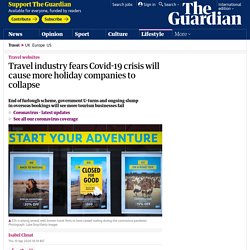
Several longstanding travel companies have failed during the pandemic, among them touring company Shearings in May and round-the-world ticket specialist STA in August. On Monday, Cities Direct ceased trading. It had been operating for 20 years. Industry bosses have voiced concerns about the closure of the government’s furlough scheme at the end of October, as well as the ongoing slump in overseas bookings, a double whammy that may be the death knell of more businesses. In a statement issued by the Association of Independent Tour Operators (Aito) – of which Cities Direct was a member – executive director Martyn Sumners said many formerly vibrant companies are now in desperate straits because of the pandemic. “It’s hard to imagine how a lot of companies will get through it if they don’t have healthy reserves. Latest Developments in Responsible Tourism 08/17 2020 - Responsible Tourism Partnership.
Covid-19 the New NormalDestinations Rethinking Tourism More conscious travellers Trust and Confidence Travel RouletteEasing of Restrictions in South Africa Anti-lockdown ProtestsThe Pope speaks out for Responsible Tourism The future of cruise tourismMiscellany The next edition will be out at the beginning of SeptemberThe Responsible Tourism Hub provides quick links to curated material on Responsible Tourism 1.

Preventing a Global Education Disaster by Kevin Watkins. The education losses resulting from the COVID-19 pandemic are invisible, but will leave millions of the world’s poorest children carrying the scars of diminished opportunity for the rest of their lives.
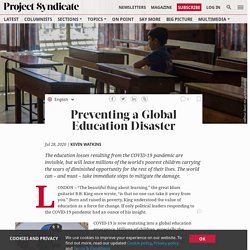
The world can – and must – take immediate steps to mitigate the damage. LONDON – “The beautiful thing about learning,” the great blues guitarist B.B. King once wrote, “is that no one can take it away from you.” Nursing Clio Death, Distance, and the Digital World. My neighbor died as I was finishing this essay.
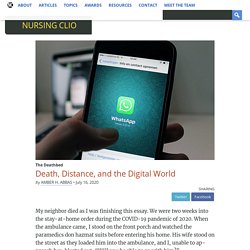
We were two weeks into the stay-at-home order during the COVID-19 pandemic of 2020. When the ambulance came, I stood on the front porch and watched the paramedics don hazmat suits before entering his home. His wife stood on the street as they loaded him into the ambulance, and I, unable to approach her, blurted out, “Will you be able to go with him?” “They said I can go if I wear a mask,” she replied. But they wouldn’t let her into the hospital. From policy paradox to post-COVID resilience. This COVID-19 crisis and the resulting ambiguities have forced individuals, societies and governments to contemplate on our value systems and our economic and social order.
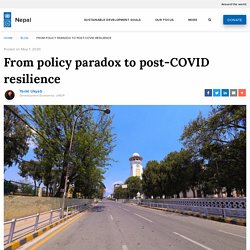
In this critical inflection point in the global thought process, incentives and opportunities for transformation are ripe. And in many ways, this affords Nepal a portal to re-assess and re-imagine our development paradigm and launch the country on a trajectory to resilience. In the short-term however, the most immediate policy challenge remains the perceived tradeoff between lives and livelihoods. 4000 children may die in Nepal in next six months due to lockdown, UNICEF warns - myRepublica - The New York Times Partner, Latest news of Nepal in English, Latest News Articles. KATHMANDU, May 13: As many as 4000 children may die in Nepal over the next six months due to the lockdown enforced to curb the spread of coronavirus, a UN agency has warned.
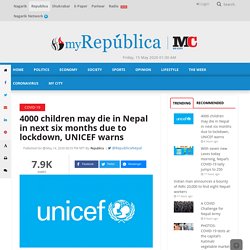
In a statement on Wednesday, the United Nations Children's Fund estimated that 440,000 children will affected in South Asia over the next six months if countries do not take an immediate action. “An additional 2,400 children could die every day from preventable causes over the next six months in South Asia as the novel coronavirus (COVID-19) pandemic continues to weaken health systems and disrupt routine services across the region,” the UNICEF said. The numbers are based on analysis by researchers from the Johns Hopkins Bloomberg School of Public Health, newly published in The Lancet Global Health journal.
'We did it to ourselves': scientist says intrusion into nature led to pandemic. The vast illegal wildlife trade and humanity’s excessive intrusion into nature is to blame for the coronavirus pandemic, according to a leading US scientist who says “this is not nature’s revenge, we did it to ourselves”. Scientists are discovering two to four new viruses are created every year as a result of human infringement on the natural world, and any one of those could turn into a pandemic, according to Thomas Lovejoy, who coined the term “biological diversity” in 1980 and is often referred to as the godfather of biodiversity. “This pandemic is the consequence of our persistent and excessive intrusion in nature and the vast illegal wildlife trade, and in particular, the wildlife markets, the wet markets, of south Asia and bush meat markets of Africa… It’s pretty obvious, it was just a matter of time before something like this was going to happen,” said Lovejoy, a senior fellow at the United Nations Foundation and professor of environment science at George Mason University.
Geshe Tenzin Namdak' advice on Covid-19. COVID-19 Taught Me My Lizard Brain is Racist (and Yours Probably is Too) - Learning Service. This is a guest post by educator and coach Jenny Wagner. I have no desire to be repatriated right now. I feel this with visceral certainty while watching my six month old daughter sitting on a rug in our bedroom, happily chewing on the limbs of a teddy bear. My husband sits next to her, savoring his morning coffee in front of the television, listening to the latest coronavirus updates in Wolof and French on TFM, a major Senegalese news outlet.
I’m outside on our balcony, eating a chocolate croissant amongst the potted plants and listening to the distant rumble of the ocean and the clip clop of hooves from a fish seller’s horse cart. We live in Dakar, Senegal, and at the time I’m writing this there are 278 confirmed cases of COVID-19, 2 deaths, and 152 recoveries. Something about the concept “last flight out” triggers a deep, primordial fear in me, and pulls up images from the depth of my imagination that I didn’t realize were lurking there. Coronavirus offers a blank page for a new beginning says Li Edelkoort.
The coronavirus epidemic will lead to "a global recession of a magnitude that has not been experienced before" but will eventually allow humanity to reset its values, according to trend forecaster Li Edelkoort. Edelkoort told Dezeen that the virus was causing a "quarantine of consumption" and would have a profound cultural and economic impact. People would have to get used to living with fewer possessions and travelling less, she said, as the virus disrupts global supply chains and transportation networks.
"A quarantine of consumption" "It seems we are massively entering a quarantine of consumption where we will learn how to be happy just with a simple dress, rediscovering old favourites we own, reading a forgotten book and cooking up a storm to make life beautiful," she said. However, the virus was also showing how economic disruption could have environmental benefits, she argued. "I am hopeful for a better system" Events should "stop organising today" Photo is by Koen Hauser. How to Create a Better Post-COVID-19 World - Alan Lew - Medium. COVID-19: Imperial researchers model likely impact of public health measures. We will not overcome the virus unless we develop a collective consciousness.
There may be some people who think that Covid-19 is an act of God. Yuval Noah Harari: the world after coronavirus. Humankind is now facing a global crisis. Covid-19 – an unfolding story that hasn’t been written yet. How can we shape the narrative? – Alice Sachrajda. How do you feel right now? Upbeat, hopeful, motivated?
I dearly hope so, but I’m willing to bet over the past few weeks you’ve experienced a flood of emotions that have made you feel anxious, upset, stretched and downright overwhelmed. The world before this coronavirus and after cannot be the same. Coronavirus: who will be winners and losers in new world order?